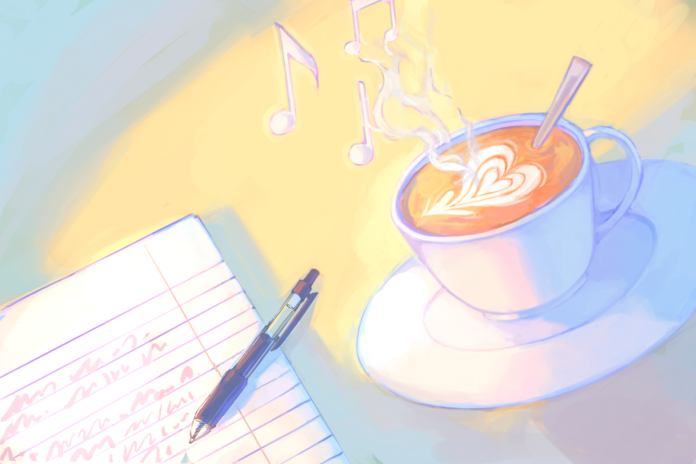An eavesdropper’s guide to philosophical banter
By NEVAEH KARRAKER— nakarraker@ucdavis.edu
I’m a very nosy person, and the amount of gossip I’ve overheard simply because of unconcerned, noisy people is practically absurd — especially at coffee shops.
Today, I chose Mishka’s, a café enclosed by cinnabar red walls, filled with warm lights and the scent of homemade pastries. My unassigned-assigned seat next to the window was unfortunately occupied by a man. After ordering, I slid into a wooden bench nearby.
Just as I was about to deeply engross myself in my book, I vaguely registered someone’s anxious leg-bouncing cease. My concentration momentarily faltered as I watched the man next to me run his hands through his dark, combed hair, then followed his gaze to the entrance.
A tall stranger had stepped in, his footsteps silent on the polished, hardwood floors. His eyes were impassive — trained ahead on an invisible and insignificant destination, yet exuding an air of intelligence.
“Ah, the musician,” the stranger said satirically yet enthusiastically as he approached the table.
The person next to me — the alleged musician — looked up and grinned.
“I had a feeling you would show up.”
“So,” the stranger said as he sat down. “Do you also come here often?”
“I guess you could say today was spontaneous.”
The stranger smiled uncomfortably and titled his head in confusion. “I admire you,” he said. “Spontaneity was never a fond friend of mine, I prefer structure and contemplative decisions.”
This response seemed backhanded and vain. The stranger struck me as someone who never looked back — in an unpleasant way.
“Well, that’s because you’re a poet,” the musician snorted. “Anyone could guess that.”
“Is that why you play music, then? Since it embodies adventure, like you?” the poet asked in answer.
The musician’s face settled in thought. “It’s almost like another language; it expands upon culture and contains profound symbolism,” he said and nodded, pleased with his response.
“What else?”
He frowned. “What do you mean?”
“It’s almost as if you’re trying to persuade me that it’s appealing. I’m asking what does music mean to you, personally?”
Silence fell upon the shop. “I love the community,” the musician deciphered. “But the thing I love most is improvising — the exhilarating feeling when the rhythm collectively becomes a part of us. It’s unlike anything you’ve ever felt.” A smile of pure joy spread across his lips.
The poet returned the sentiment; He liked it when passion emanated from one’s soul.
“I feel like improvising is unnecessary for writing, though. I mean, why do you have to do it for music?” he challenged. “Why not just play the notes already written?”
The musician smirked, eyes sparkling with amusement. “Try writing what you feel in the moment; you become discontented when you produce art for others,” the musician said, swirling his coffee.
I bit back laughter; they were both hypocrites.
“Alright,” the poet said. “I respect that, although I don’t understand.”
The musician’s brows furrowed. He hesitated, the air frozen in anticipation. “I want to,” he eventually drew out. “If you can explain again?” a faint touch of desperation lined his voice. Sighing, the musician slowly shook his head. “I…don’t know how to articulate it.”
The poet pursed his lips in rumination.
“Sometimes explaining things — like a joke — causes it to lose its value. I assume this depends upon experience.”
“Yes, I would say so,” the musician said slowly. “An artist’s identity is their work, and anyone can play music another has written.”
There’s a contrast between music and musician; there was none with poem and poet. Music cannot grow limbs like a poem can, as its versatility inhibits it. A musician can live in their work, a poet cannot. No one can replicate a poet’s work. No one can comprehend the poem like the author. It was horribly limiting to be unable to share that passion, the poet thought.
Finally, the musician asked: “Tell me this: Could you go a day without writing?”
“No, of course not,” the poet responded.
“And I can’t go a day without playing. I think we know one another.”
A grin played about on the poet’s lips.
The musician brought up a good point: People forget musicians and poets are both artists, they simply have different mediums. The musician’s mind truly fit his description — similar to soundwaves, it was leaning and bending with the tide of pitch and genre, omnidirectional and longitudinal, vigorous and enormously intense, vastly different from the rigidity of the poet’s mind.
It was invigorating. And, like learning the style of a new author, maybe one day the poet could recognize the musician’s patterns.
They exchanged some final words before the poet departed, but not before my eyes widened; They were wearing the same red sweater.
And then, as the poet stood at the door, for some odd, unknown reason, he looked over his shoulder.
Written by: Nevaeh Karraker—nakarraker@ucdavis.edu
Disclaimer: (This article is humor and/or satire, and its content is purely fictional. The story and the names of “sources” are fictionalized.)










